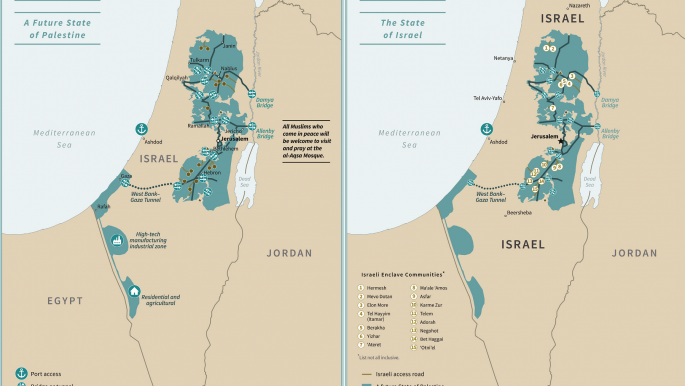Gulf states give warm welcome to Trump’s peace deal despite Palestinian fury
The plan, which the Palestinian Authority have called a "conspiracy", grants Israel much of what it has sought in decades of international diplomacy, namely control over Jerusalem as its "undivided" capital, rather than a city to share with the Palestinians. The plan also lets Israel annex West Bank settlements, leading observers to point out the plan will enable mass expulsion of Palestinians from the West Bank.
The plan would also end the so-called "right of return", meaning the millions of Palestinians and their descendants who fled or were forced out when the Jewish state was created in 1948 would no longer have a case to go back.
Read more: 'Deal of the Century': Palestinians feel letdown but can they resist American and Israeli dictation?
UAE
The United Arab Emirates, which sent its ambassador to Trump's announcement alongside Netanyahu despite not recognising the Jewish state, praised the plan, saying it "appreciates" US efforts for peace.
"This plan is a serious initiative that addresses many issues raised over the years," the Emirati Ambassador in Washington Yousef Al Otaiba said in a statement on Tuesday.
"The UAE believes that Palestinians and Israelis can achieve lasting peace and genuine coexistence with the support of the international community," Otaiba said.
"The plan announced today offers an important starting point for a return to negotiations within a US-led international framework."
Twitter Post
|
Saudi Arabia
Saudi's foreign ministry said it "appreciates" Trump's efforts and called for the start of direct talks between Israel and the Palestinians.
Any disagreements with the plan should be resolved through negotiations under the auspices of the United States, it said.
Saudi King Salman meanwhile stressed "the kingdom's steadfast stance on the Palestinian issue and the rights of the Palestinian people".
Bahrain
Bahrain's Ambassador to Washington was also present at the White House for Trump's announcement, backing Trump's claim that he there is growing support around the region for his plan.
The foreign ministry issued an Arabic-language statement saying it "commends the United States for its unremitting efforts to advance the peace process".
It added it encouraged the two sides to begin direct negotiations under American sponsorship.
Bahrain hosted the July 2019 conference which presented the economic side of the plan designed by Trump's adviser and son-in-law, Jared Kushner. In the "Peace to Prosperity workshop" attended by many wealthy Gulf Arab and Israeli business figures, Kushner dangled an offer of $50 billion investment for the region if the Palestinians agree to a political deal.
The Palestinian leadership boycotted the conference, accusing the administration of ignoring key political issues and trying to buy its acceptance of Israeli rule.
Qatar
The tiny Gulf kingdom issued a more cautious response to the announcement, saying it welcomed efforts to broker "longstanding peace" but warned that was unattainable without concessions to the Palestinians.
Qatar is a supporter of the Palestinian cause and has previously hosted leaders of Hamas, the Islamist movement that rules the Gaza Strip.
The gas-rich Gulf state has provided millions of dollars in aid to Gaza to fund fuel deliveries to the territory's sole power station and cash handouts to needy families.
But Qatar is also a strong ally of the United States. It hosts Washington's largest air base in the region, claiming to have spent $8 billion supporting US operations and pledges to invest $1.8 billion more to upgrade the facility.
Twitter Post
|
"Qatar welcomes all efforts aiming towards a longstanding peace in the occupied Palestinian territories, appreciating the endeavours of the current US administration to find solutions for the Palestinian-Israeli conflict," the state-run Qatar News Agency reported.
"Qatar reaffirms its commitment for supporting the Palestinian institutions, noting that peace cannot be sustainable if Palestinians rights in their sovereign state... including east Jerusalem, and the right of return are not preserved."
Egypt
Egypt called on "the two concerned parties to undertake a careful and thorough examination of the US vision to achieve peace and open channels of dialogue".
The foreign ministry added that negotiations should aim for "a comprehensive and just peace and the establishment of an independent Palestinian state".
Egypt and Jordan are the only Arab countries to have formal relations with Israel.
Agencies contributed to this report.





 Follow the Middle East's top stories in English at The New Arab on Google News
Follow the Middle East's top stories in English at The New Arab on Google News
![The UAE is widely suspected of arming the RSF militia [Getty]](/sites/default/files/styles/image_330x185/public/2024-11/GettyImages-472529908.jpg?h=69f2b9d0&itok=Yauw3YTG)
![Netanyahu furiously denounced the ICC [Getty]](/sites/default/files/styles/image_330x185/public/2024-11/GettyImages-2169352575.jpg?h=199d8c1f&itok=-vRiruf5)
![Both Hamas and the Palestinian Authority welcomed the ICC arrest warrants [Getty]](/sites/default/files/styles/image_330x185/public/2024-11/GettyImages-2178351173.jpg?h=199d8c1f&itok=TV858iVg)